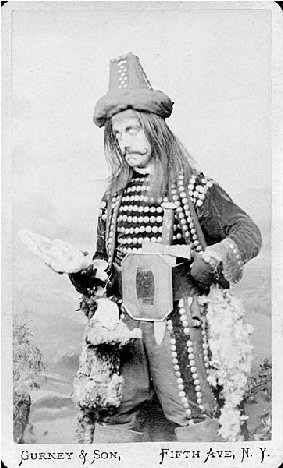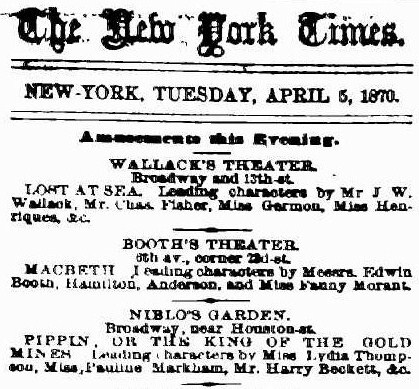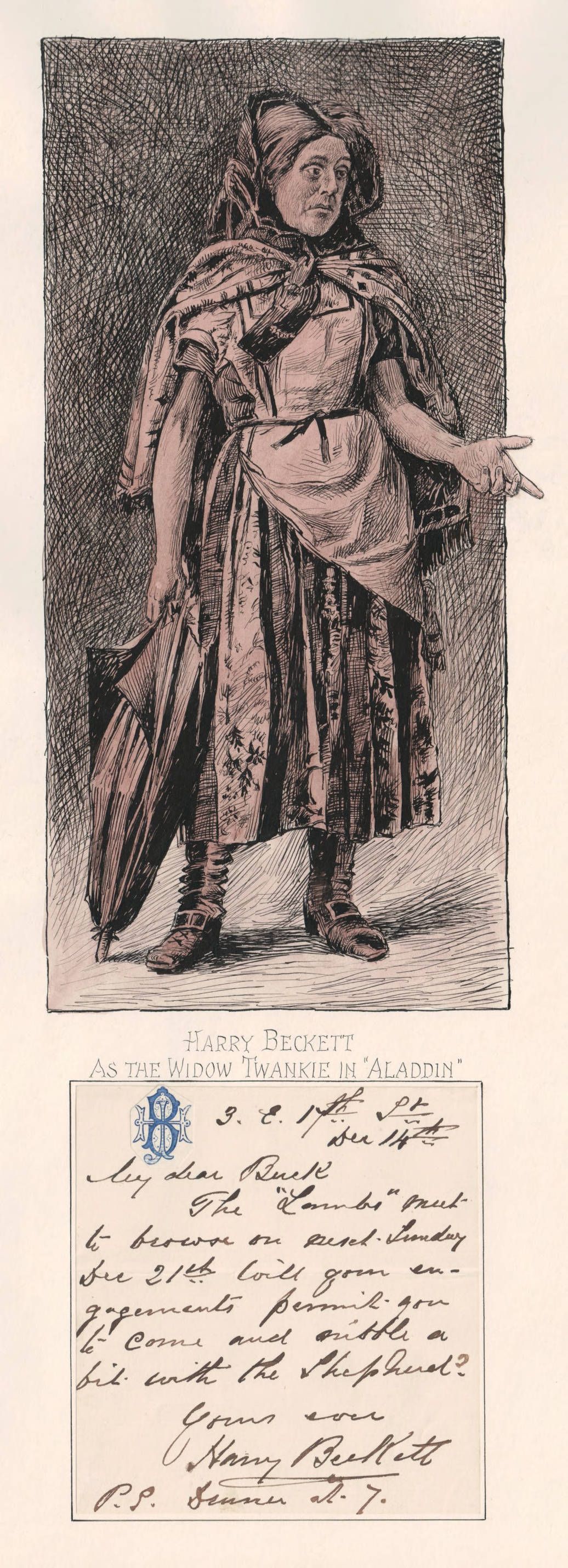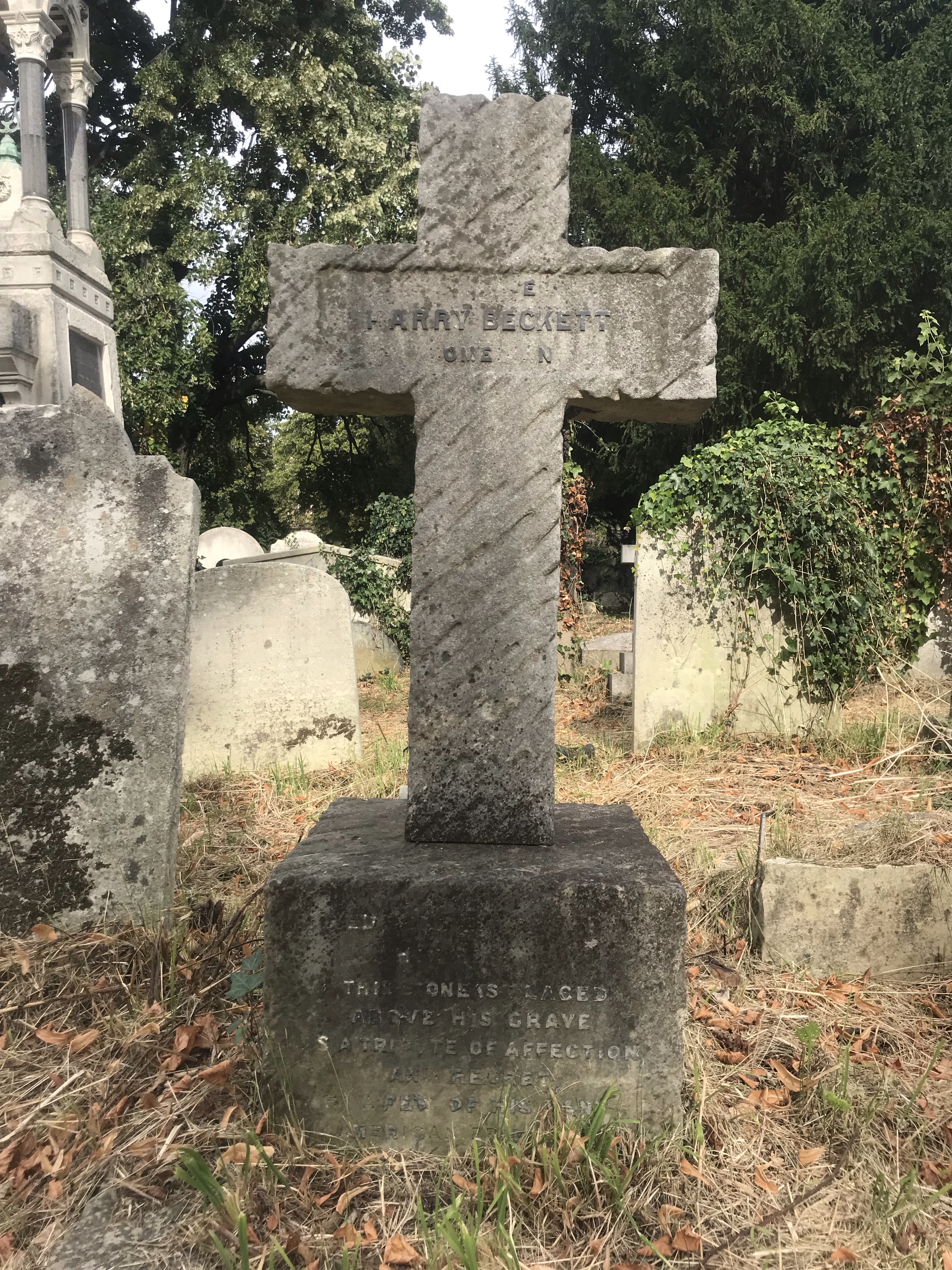~ The Fitchburg Sentinel [Massachusetts], 25 Oct 1880
~~~~~~~~~~~~~~~~~~~~~~~~~~~~~~~~~~~~~
Harry Beckett, Comedian.
The news of Mr. Harry Beckett's death will be read with deep regret by all the theatre-goers of this City, which has been for years, artistically, his abiding place. Outside of New York he was not well known, but within the Metropolis his friends and admirers were to be found among all classes of the people. It is not often that an actor's reputation is absolutely identified with a single city and a single theatre; but such was the case with Mr. Beckett, who successful career was developed upon the stage of Wallack's. As a low comedian he has had but one important rival during the last decade in New York – Mr. James Lewis – and it speaks well for him that his hold upon the popular affection was maintained until the day of his departure. Mr. Beckett was, technically, a low comedian, but he had also a fine sense of eccentric humor, and a very marked sympathy with the bold and picturesque features of drama. Those who have seen him perform in "The Rivals," "To Oblige Benson," and "The Shaughraun" can form an accurate notion of his scope as an actor – a scope that extended far beyond the limits of low comedy. His style as a humorist was broad and mellow; his method was that of a man of taste and refinement, an intelligent observer, and was at times strengthened by original perception; he respected traditions, but he was not a slavish follower in the old lines and ideas of the stage; what he lacked chiefly was spontaneity, the absence of which was occasionally hidden by a reckless verve that was nearly always effective. He had not the deep insight nor the finished art, nor the genius of humor which distinguish the pure and great comedian, but he played many parts ably, few parts remarkably well, and seldom played badly. His popularity at Wallack's never flagged, and when, in the beginning of the Summer, he bade farewell to his friends – at a benefit performance given in his honor at that house – he was applauded with a good will and en enthusiasm that were more eloquent than the most impassioned eulogy. He was one of those actors who are both admired and loved, and it is on this account chiefly that he will be sadly missed from the ranks of our best players.
Mr. Beckett was born in London over 41 years ago, on June 10, 1839. His father died at an early age, and he was left under the sole care of his mother, a well-known actress, who brought him up carefully and had him trained as a violinist. But young Beckett was not ambitious to make his game as a musician, and in his boyhood showed a decided taste for the stage. He made his way to Manchester before he was well out of his teens, and got a place in one of the theatres of that city as a utility actor. He was more or less under the eyes of Charles Mathews, who had great faith in the young beginner, and was wont to rely upon him for a large variety of parts. After remaining in Manchester for some time he started upon the famous Exeter Circuit, and had the advantage for a while of the experience and knowledge of Mr. Frank Belton, who instructed him in the methods of old comedy. After wandering about, studying, acting, and making himself thoroughly familiar with the state, he went to Birmingham. He was then 29 years old, healthy, ambitious, and full of talent. It was at this period of his career that, forsaking England and giving up temporarily all hope of appearing in London, he set sail for the United State. He arrived in New York in September, 1868, acted at the old Wood's Museum and at the Waverley Theatre, and finally appeared at Niblo's Garden, and later at Wallack's Theatre in conjunction with the Lydia Thompson burlesque troupe. His first part here, at Wood's Museum, was Minerva in F. C. Burnand's burlesque of "Ixion," and on the same night he played, with much vivacious humor, the mystified hero of the old farce, "Did you ever send your wife to Jersey?" He made a tour of the country afterward with Lydia Thompson, and in 1869 returned to England. He did not stay long abroad, and, on his return, was engaged by Mr. Wallack as low comedian of Wallack's theatre. This engagement surprised the public, to whom Mr. Beckett was simply known as a clever and amusing performer in burlesque, but Mrs. Wallack's choice, it was soon discovered, had been made upon excellent grounds. Mr. Beckett made his first appearance with the regular company of the theatre during the season of 1873-4, in the month of September. His opening part was in "Barwise's Book," a poor part in an indifferent play. A short time later he came forward as Tony Lumpkin in "She Stoops to Conquer," and his acting in this character showed immediately that he was a low comedian of a more than common grade. He leaped from burlesque to comedy, so to speak, at a bound, and his success in his new field of effort was commented upon with surprise and satisfaction; but it must be borne in mind that the young comedian had undergone a hard preliminary training in England, and that, although identified in the public mind with characters like the fiercely humorous Blue-beard, he was really well versed in the spirit of old comedy. Mr. Beckett's performance as Bob Acres, in "The Rivals," was his next successful experiment, and this was followed by others of equal value. It would be impossible to notice all the parts in which he was been seen and admired during the seasons that intervened between 1873 and the one that closed last May; but we might recall with a sentiment of pleasure a few of his strongest impersonations, such, for example, as Papillon, in "The Liar:" Zekiel Homespun, in "the Heir at Law'" Mr. Krux, in "School;" Harvey Duff, in "The Shaughraun;" Goldfinch, in "The Road to Ruin;" Moses, in "The School for Scandal;" Mr. Willowear, in "To Marry or Not To Marry;" Plantaganet G. Potter, in "Our Girls," and many others, which belong to various schools of drama and to various styles of humor. His acting in "the Shaughraun" was particularly strong and picturesque, and will always be remembered as one of the boldest features of the beautiful performance of that play given at Wallack's; and in "To Oblige Benson" his acting was a very subtle and lively mingling of the serious and the broadly comic. His Tony Lumpkin and Bob Acres were likewise memorable performances. It will be seen, therefore, that versatility was one of Mr. Beckett's qualities as an actor, and this versatility was made more marked by his fine skill in "making up" for the stage. He was fortunate in possessing a very expressive face, the best features of which were the eyes; a lithe and graceful figure, and a voice that was deep, strong, and flexible. He was, without doubt, one of the most conscientious actors of his time.
Mr. Beckett's manner off the stage was, as a rule, serious and gentlemanly; but in good fellowship the fun in him was easily moved, and he was looked upon as one of the most delightful of companions. His brother actors valued his friendship highly, and it will not be forgotten how deep was the attachment between him and the late Mr. Montague. He was among the seven founders of the Lambs' Club – a popular association of actors in this City – and was one of the brightest and most beloved members of the club. He went to England last Summer for the purpose of placing his children at school in London, and in order to fulfill one of the aspirations of his life – to appear upon the London state as a comedian already famous in another land. He made his appearance in London in Boucicault's "Bridal Tour," a rearrangement of the same author's "Marriage," which had been originally produced at Wallack's, with Mr. Beckett in the part played by him abroad. The comedy, however, was not successful; and, to make matters worse, Mr. Beckett fell ill, and was soon confined to his bed. It was not believed that this illness would end in death; but death came quickly and suddenly, and the hopes and ambitions of the actor have been harshly crushed in the very prime of his career. He leaves behind him a wife, who was warmly respected during her residence in this City, and who was known before her marriage as Miss Maggie Desmond. The memory of the dead comedian will be tenderly cherished by those who knew him intimately and who were able to appreciate the manliness, unselfishness, and earnestness of his private character, and by the great public which knew him only as an actor, but whose affection for him was not on that account less sincere and hearty. An actor can make his personality felt to people even over the barrier of the footlights, and Mr. Beckett succeeded in doing this.
~ The New York Times, 25 Oct 1880
~~~~~~~~~~~~~~~~~~~~~~~~~~~~~~~~~~~~~
Contributed by [email protected]:
Harry Beckett is buried in the Brompton Cemetery in London UK in a section containing quite a few actors and musicians.
~ The Fitchburg Sentinel [Massachusetts], 25 Oct 1880
~~~~~~~~~~~~~~~~~~~~~~~~~~~~~~~~~~~~~
Harry Beckett, Comedian.
The news of Mr. Harry Beckett's death will be read with deep regret by all the theatre-goers of this City, which has been for years, artistically, his abiding place. Outside of New York he was not well known, but within the Metropolis his friends and admirers were to be found among all classes of the people. It is not often that an actor's reputation is absolutely identified with a single city and a single theatre; but such was the case with Mr. Beckett, who successful career was developed upon the stage of Wallack's. As a low comedian he has had but one important rival during the last decade in New York – Mr. James Lewis – and it speaks well for him that his hold upon the popular affection was maintained until the day of his departure. Mr. Beckett was, technically, a low comedian, but he had also a fine sense of eccentric humor, and a very marked sympathy with the bold and picturesque features of drama. Those who have seen him perform in "The Rivals," "To Oblige Benson," and "The Shaughraun" can form an accurate notion of his scope as an actor – a scope that extended far beyond the limits of low comedy. His style as a humorist was broad and mellow; his method was that of a man of taste and refinement, an intelligent observer, and was at times strengthened by original perception; he respected traditions, but he was not a slavish follower in the old lines and ideas of the stage; what he lacked chiefly was spontaneity, the absence of which was occasionally hidden by a reckless verve that was nearly always effective. He had not the deep insight nor the finished art, nor the genius of humor which distinguish the pure and great comedian, but he played many parts ably, few parts remarkably well, and seldom played badly. His popularity at Wallack's never flagged, and when, in the beginning of the Summer, he bade farewell to his friends – at a benefit performance given in his honor at that house – he was applauded with a good will and en enthusiasm that were more eloquent than the most impassioned eulogy. He was one of those actors who are both admired and loved, and it is on this account chiefly that he will be sadly missed from the ranks of our best players.
Mr. Beckett was born in London over 41 years ago, on June 10, 1839. His father died at an early age, and he was left under the sole care of his mother, a well-known actress, who brought him up carefully and had him trained as a violinist. But young Beckett was not ambitious to make his game as a musician, and in his boyhood showed a decided taste for the stage. He made his way to Manchester before he was well out of his teens, and got a place in one of the theatres of that city as a utility actor. He was more or less under the eyes of Charles Mathews, who had great faith in the young beginner, and was wont to rely upon him for a large variety of parts. After remaining in Manchester for some time he started upon the famous Exeter Circuit, and had the advantage for a while of the experience and knowledge of Mr. Frank Belton, who instructed him in the methods of old comedy. After wandering about, studying, acting, and making himself thoroughly familiar with the state, he went to Birmingham. He was then 29 years old, healthy, ambitious, and full of talent. It was at this period of his career that, forsaking England and giving up temporarily all hope of appearing in London, he set sail for the United State. He arrived in New York in September, 1868, acted at the old Wood's Museum and at the Waverley Theatre, and finally appeared at Niblo's Garden, and later at Wallack's Theatre in conjunction with the Lydia Thompson burlesque troupe. His first part here, at Wood's Museum, was Minerva in F. C. Burnand's burlesque of "Ixion," and on the same night he played, with much vivacious humor, the mystified hero of the old farce, "Did you ever send your wife to Jersey?" He made a tour of the country afterward with Lydia Thompson, and in 1869 returned to England. He did not stay long abroad, and, on his return, was engaged by Mr. Wallack as low comedian of Wallack's theatre. This engagement surprised the public, to whom Mr. Beckett was simply known as a clever and amusing performer in burlesque, but Mrs. Wallack's choice, it was soon discovered, had been made upon excellent grounds. Mr. Beckett made his first appearance with the regular company of the theatre during the season of 1873-4, in the month of September. His opening part was in "Barwise's Book," a poor part in an indifferent play. A short time later he came forward as Tony Lumpkin in "She Stoops to Conquer," and his acting in this character showed immediately that he was a low comedian of a more than common grade. He leaped from burlesque to comedy, so to speak, at a bound, and his success in his new field of effort was commented upon with surprise and satisfaction; but it must be borne in mind that the young comedian had undergone a hard preliminary training in England, and that, although identified in the public mind with characters like the fiercely humorous Blue-beard, he was really well versed in the spirit of old comedy. Mr. Beckett's performance as Bob Acres, in "The Rivals," was his next successful experiment, and this was followed by others of equal value. It would be impossible to notice all the parts in which he was been seen and admired during the seasons that intervened between 1873 and the one that closed last May; but we might recall with a sentiment of pleasure a few of his strongest impersonations, such, for example, as Papillon, in "The Liar:" Zekiel Homespun, in "the Heir at Law'" Mr. Krux, in "School;" Harvey Duff, in "The Shaughraun;" Goldfinch, in "The Road to Ruin;" Moses, in "The School for Scandal;" Mr. Willowear, in "To Marry or Not To Marry;" Plantaganet G. Potter, in "Our Girls," and many others, which belong to various schools of drama and to various styles of humor. His acting in "the Shaughraun" was particularly strong and picturesque, and will always be remembered as one of the boldest features of the beautiful performance of that play given at Wallack's; and in "To Oblige Benson" his acting was a very subtle and lively mingling of the serious and the broadly comic. His Tony Lumpkin and Bob Acres were likewise memorable performances. It will be seen, therefore, that versatility was one of Mr. Beckett's qualities as an actor, and this versatility was made more marked by his fine skill in "making up" for the stage. He was fortunate in possessing a very expressive face, the best features of which were the eyes; a lithe and graceful figure, and a voice that was deep, strong, and flexible. He was, without doubt, one of the most conscientious actors of his time.
Mr. Beckett's manner off the stage was, as a rule, serious and gentlemanly; but in good fellowship the fun in him was easily moved, and he was looked upon as one of the most delightful of companions. His brother actors valued his friendship highly, and it will not be forgotten how deep was the attachment between him and the late Mr. Montague. He was among the seven founders of the Lambs' Club – a popular association of actors in this City – and was one of the brightest and most beloved members of the club. He went to England last Summer for the purpose of placing his children at school in London, and in order to fulfill one of the aspirations of his life – to appear upon the London state as a comedian already famous in another land. He made his appearance in London in Boucicault's "Bridal Tour," a rearrangement of the same author's "Marriage," which had been originally produced at Wallack's, with Mr. Beckett in the part played by him abroad. The comedy, however, was not successful; and, to make matters worse, Mr. Beckett fell ill, and was soon confined to his bed. It was not believed that this illness would end in death; but death came quickly and suddenly, and the hopes and ambitions of the actor have been harshly crushed in the very prime of his career. He leaves behind him a wife, who was warmly respected during her residence in this City, and who was known before her marriage as Miss Maggie Desmond. The memory of the dead comedian will be tenderly cherished by those who knew him intimately and who were able to appreciate the manliness, unselfishness, and earnestness of his private character, and by the great public which knew him only as an actor, but whose affection for him was not on that account less sincere and hearty. An actor can make his personality felt to people even over the barrier of the footlights, and Mr. Beckett succeeded in doing this.
~ The New York Times, 25 Oct 1880
~~~~~~~~~~~~~~~~~~~~~~~~~~~~~~~~~~~~~
Contributed by [email protected]:
Harry Beckett is buried in the Brompton Cemetery in London UK in a section containing quite a few actors and musicians.
Advertisement
Explore more
Sponsored by Ancestry
Advertisement









